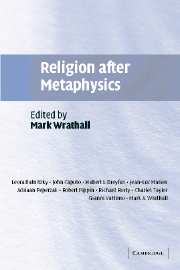Book contents
- Frontmatter
- Contents
- List of contributors
- Preface
- 1 Introduction: metaphysics and onto-theology
- 2 Love and death in Nietzsche
- 3 After onto-theology: philosophy between science and religion
- 4 Anti-clericalism and atheism
- 5 Closed world structures
- 6 Between the earth and the sky: Heidegger on life after the death of God
- 7 Christianity without onto-theology: Kierkegaard's account of the self's movement from despair to bliss
- 8 Religion after onto-theology?
- 9 The experience of God and the axiology of the impossible
- 10 Jewish philosophy after metaphysics
- 11 The “end of metaphysics” as a possibility
- Index
4 - Anti-clericalism and atheism
Published online by Cambridge University Press: 21 May 2010
- Frontmatter
- Contents
- List of contributors
- Preface
- 1 Introduction: metaphysics and onto-theology
- 2 Love and death in Nietzsche
- 3 After onto-theology: philosophy between science and religion
- 4 Anti-clericalism and atheism
- 5 Closed world structures
- 6 Between the earth and the sky: Heidegger on life after the death of God
- 7 Christianity without onto-theology: Kierkegaard's account of the self's movement from despair to bliss
- 8 Religion after onto-theology?
- 9 The experience of God and the axiology of the impossible
- 10 Jewish philosophy after metaphysics
- 11 The “end of metaphysics” as a possibility
- Index
Summary
Some day, intellectual historians may remark that the twentieth century was the one in which the philosophy professors began to stop asking bad questions – questions like “What really exists?” “What are the scope and limits of human knowledge?” and “How does language hook up with reality?” These questions assume that philosophy can be done ahistorically. They presuppose the bad idea that inspection of our present practices can give us an understanding of the “structure” of all possible human practices.
“Structure” is just another word for “essence.” The most important movements in twentieth-century philosophy have been anti-essentialist. These movements have mocked the ambitions of their predecessors, positivism and phenomenology, to do what Plato and Aristotle had hoped to do – sift out the changing appearances from the enduringly real, the merely contingent from the truly necessary. Recent examples of this mockery are Jacques Derrida's Margins of Philosophy and Bas van Fraassen's The Empirical Stance. These books stand on the shoulders of Heidegger's Being and Time, Dewey's Reconstruction in Philosophy, and Wittgenstein's Philosophical Investigations. All these anti-essentialist books urge us to fight free of the old Greek distinctions between the apparent and the real, and between the necessary and the contingent.
- Type
- Chapter
- Information
- Religion after Metaphysics , pp. 37 - 46Publisher: Cambridge University PressPrint publication year: 2003
- 5
- Cited by



